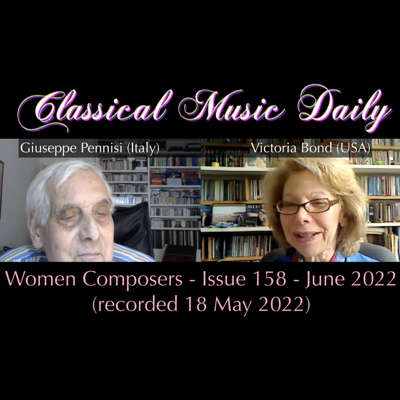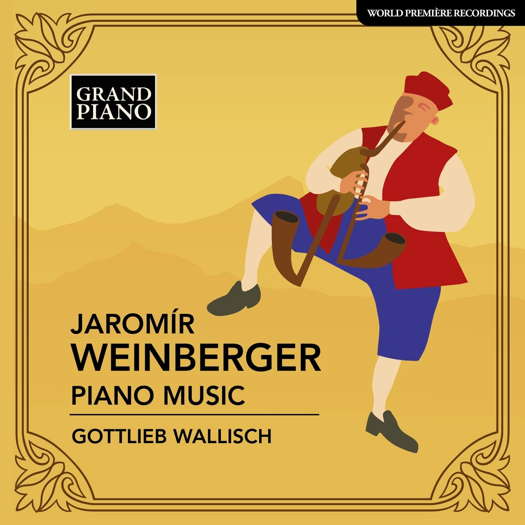 VIDEO PODCAST: Women Composers - Our special hour-long illustrated feature on women composers includes contributions from Diana Ambache, Gail Wein, Hilary Tann, Natalie Artemas-Polak and Victoria Bond.
VIDEO PODCAST: Women Composers - Our special hour-long illustrated feature on women composers includes contributions from Diana Ambache, Gail Wein, Hilary Tann, Natalie Artemas-Polak and Victoria Bond.
- Aase Nordmo Løvberg
- Milka Stojanović
- Alfven
- Eileen Farrell
- classical music and money
- Donatella Flick LSO Conducting Competition
- Bridge Records
- Sedona
 DISCUSSION: John Dante Prevedini leads a discussion about Composers, individuals or collective?, including contributions from David Arditti, Halida Dinova, Robert McCarney and Jane Stanley.
DISCUSSION: John Dante Prevedini leads a discussion about Composers, individuals or collective?, including contributions from David Arditti, Halida Dinova, Robert McCarney and Jane Stanley.

Jaromír Weinberger Piano Music
GP887 (Grand Piano Records, CD)
FIRST RELEASE (11 November 2022)
Playing time: 77'03"
Tracks: 18
Booklet pages: 19
℗ 2022 HNH International Ltd
© 2022 HNH International Ltd
Main country of recording: Germany
Country of manufacture: Germany
Reviewer: Robert McCarney
Review of Jaromír Weinberger Piano Music published on 21 November 2022
Gottlieb Wallisch, piano
Jaromír Weinberger (1896-1967):
1 Sarabande (1916?)
Piano Sonata No 2 in D minor, Op 4 (1915)
2 Allegro passionato
3 Vivo ironicamente
4 Introduzione: Moderato – Fuga: Largo
Piano Sonata No 3 (Spinet Sonata) (1915)
5 Andantino
6 Menuett: Allegro giusto
7 Finale: Rondo: Vivo
8 Pavane pour Dulcinea de Toboso (1916)
9 Valses Nobles (1921–22?)
Gravures (Rytiny): Cinq Préludes et Fugues (1923)
10 Prelude No 1: Andante – Fugue No 1: Molto tranquillo
11 Prelude No 2: Moderato – Fugue No 2: Con moto
12 Prelude No 3: Allegro - Fugue No 3: Vivo
13 Prelude No 4: Molto tranquillo – Fugue No 4: L'istesso tempo
14 Prelude No 5: Vivo – Fugue No 5: Con moto
15 Mi-La-Do (1924)
Jaromír Weinberger, arranged by Gustav Blasser (1857–1942) in 1929:
Three Pieces from the opera Schwanda, the Bagpiper (1926)
16 Furiant
17 Böhmischer Tanz (Sousedská)
18 Polka
The international success of Weinberger's opera Schwanda the Bagpiper in 1927 has obscured a sequence of piano works written when the composer was still in his teens. The Second and Third Piano Sonatas form a commanding pair, both written in 1915 – the former autobiographical, playful and dark – the latter neo-Classical with Francophile elements. Elsewhere one can admire his use of sixteenth century dance forms, his melodic gifts in the Valses Nobles, and his technical command of preludes and fugues in Gravures. The three arrangements from Schwanda show his imperishable use of Bohemian dance forms.
Recorded 5-6 July 2021 (tracks 1-4, 8, 9 and 15-18) and 13-14 September 2021 (tracks 5-7 and 10-14) at Klaus-von-Bismarck-Saal, WDR Funkhaus, Cologne, Germany.

